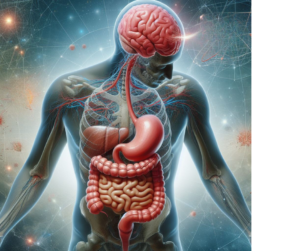Various stomach and gut health issues can significantly disrupt the digestive system, leading to discomfort, pain, and an overall decline in quality of life. These problems encompass conditions such as irritable bowel syndrome, gastroesophageal reflux disease, peptic ulcers, inflammatory bowel disease, coeliac disease, diverticulitis, and gallstones.
Table of Contents
ToggleUnderstanding Irritable Bowel Syndrome: Symptoms and Triggers
Irritable bowel syndrome (IBS) is a chronic gastrointestinal disorder that significantly impacts gut health, leading to symptoms such as abdominal pain, bloating, diarrhoea, and constipation, with some individuals experiencing both. The precise triggers for IBS can vary widely among individuals and may include genetic predispositions, dietary choices, past infections, inflammation of the gut lining, the presence of leaky gut, and an overgrowth of harmful bacteria in the gut.
Gastroesophageal Reflux Disease: Causes and Consequences
Gastroesophageal reflux disease (GERD) is a chronic condition characterized by the regular backflow of stomach acid into the esophagus, which can lead to symptoms such as heartburn, regurgitation, and chest pain. If left untreated, this condition can lead to further complications, including Barrett’s esophagus, a condition that increases the risk of esophageal cancer. The primary cause of GERD is a weakened muscular junction between the stomach and esophagus, known as the sphincter, allowing digestive acids to escape and flow back into the esophagus. Other contributing factors include delayed gastric emptying and hiatal hernias, which can also compromise the sphincter's function.
Several lifestyle factors can exacerbate GERD, including being overweight, smoking, and the consumption of certain foods and beverages such as citrus fruits, spicy dishes, fatty foods, caffeinated drinks, and alcohol. Additionally, some medications, particularly non-steroidal anti-inflammatory drugs (NSAIDs), can also contribute to the weakening of the sphincter, leading to increased acid reflux symptoms.
Peptic Ulcers: Symptoms and Causes
Peptic ulcers are painful sores that develop in the lining of the stomach, esophagus, or small intestine. Symptoms often include abdominal pain, bloating, nausea, vomiting, and unexplained weight loss. The primary cause of peptic ulcers is typically an infection caused by the bacterium Helicobacter pylori, alongside long-term use of nonsteroidal anti-inflammatory drugs (NSAIDs) and excessive stomach acid production. Additionally, lifestyle choices such as smoking and excessive alcohol consumption can also contribute to ulcer formation.
Inflammatory Bowel Disease: Understanding the Risks
Inflammatory bowel disease (IBD) is characterized by chronic inflammation of the gut and can manifest as either Crohn’s disease or ulcerative colitis. Common symptoms include abdominal pain, diarrhoea, unintentional weight loss, and fatigue. Unfortunately, this painful condition is often linked to a family history of autoimmune diseases and inflammatory bowel disease itself. Currently, there is no known cure, and individuals with IBD face an increased risk of developing bowel cancer, significantly impacting their quality of life. The inflammation of the gut lining can weaken the protective mucus layer, creating gaps between cells that line the gut, thus increasing permeability and allowing toxins and bacteria to enter the bloodstream, which can lead to pain and further systemic inflammation.
Coeliac Disease: Symptoms and Dietary Considerations
Coeliac disease is an autoimmune disorder triggered by the consumption of gluten, a protein found in wheat, rye, and barley. This disease leads to damage in the gut lining, significantly impairing nutrient absorption. Symptoms of coeliac disease can include severe diarrhoea, bloating, flatulence, indigestion, and constipation, all of which can result in significant abdominal pain. Individuals with a family history of coeliac disease or other autoimmune disorders are at a higher risk of developing this condition.
Due to its autoimmune nature, the body mistakenly attacks its own tissues in response to gluten, which can lead to chronic inflammation and further complications if not managed by strict adherence to a gluten-free diet.
Diverticulitis: Causes, Symptoms, and Management
Diverticulitis occurs when small pouches, or diverticula, develop in the walls of the large intestine and become inflamed or infected. Symptoms of this condition include bloating, abdominal pain, and changes in bowel habits, particularly chronic constipation or diarrhoea. If a person experiences severe pain, a fever, or persistent diarrhea, it is crucial to seek medical attention promptly. The main risk factors for developing diverticulitis include a low-fibre diet, particularly one high in processed foods, along with being overweight and a sedentary lifestyle.
Gallstones: Understanding Risks and Symptoms
Gallstones, although not located in the stomach or gut, can cause intense upper abdominal pain and discomfort. These stones form from hardened cholesterol, bile, and bilirubin, leading to complications when they obstruct the bile ducts. Gallstones can vary in size, from as small as a grain of sugar to as large as a golf ball or ping pong ball, and may cause nausea and vomiting. Risk factors for gallstones include being over the age of 40, being female, and having a family history of gallstones, along with being overweight and having conditions such as diabetes. Additionally, a diet low in fiber and high in processed foods can contribute to the formation of gallstones.
Effective Strategies for Preventing Common Gut and Stomach Problems

The digestive tract is often referred to as the “second brain” due to its complex network of nerves known as the enteric nervous system. In fact, this system contains more neurons than both the spinal cord and the peripheral nervous system combined. It also includes the vagus nerve
Post navigation
Previous Post
 Drywall Installation Techniques by a Handyman
Drywall Installation Techniques by a Handyman3 Comments
Comments are closed

I can really relate to the struggles you outlined with IBS and other gut health issues. After dealing with my own digestive challenges over the years, I’ve come to realize just how much our gut affects not only our physical well-being but also our mental health and overall quality of life.
I find it fascinating how interconnected gut health is with overall well-being! Personally, I’ve noticed that when I pay close attention to my diet, fewer IBS symptoms crop up. It really makes me appreciate the importance of understanding our individual triggers—like how stress can sometimes play a bigger role than we realize.
I totally get what you’re saying about gut health and its impact on overall well-being. It’s fascinating how our bodies can react so differently to various foods and stressors. I’ve been on a similar journey, trying to pinpoint my own triggers for things like bloating or fatigue. I’ve found that keeping a food diary really helps me see patterns. Sometimes it’s as simple as a certain ingredient I didn’t even think twice about.